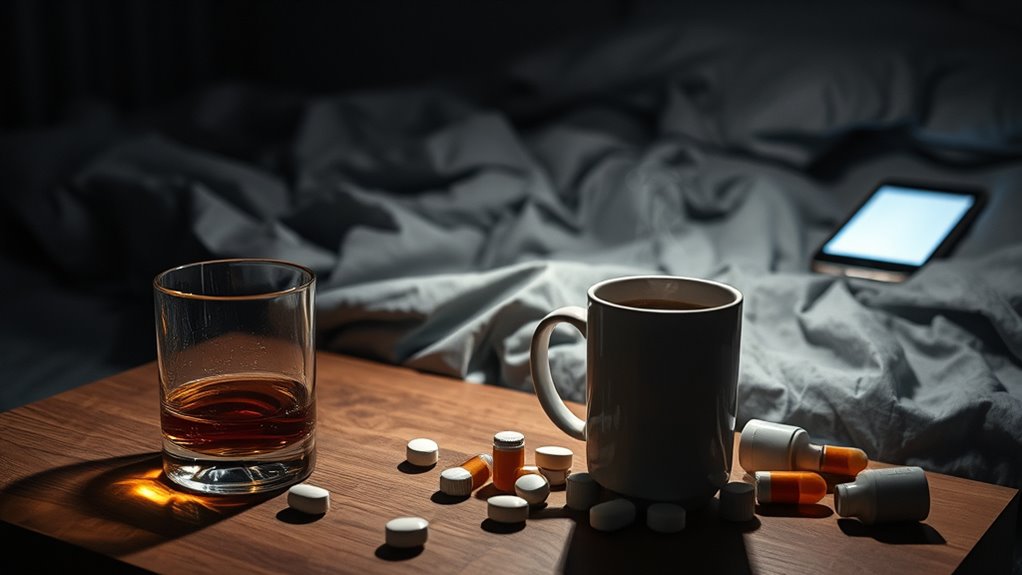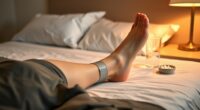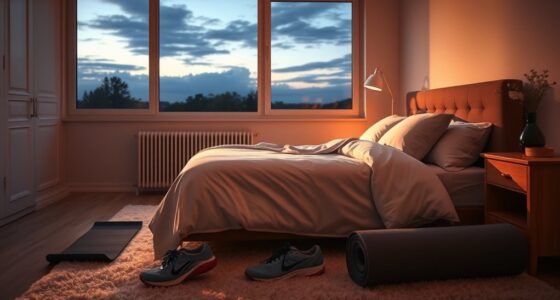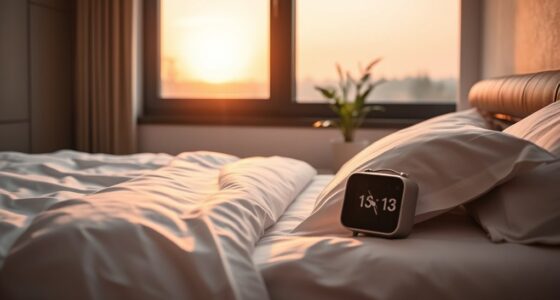Alcohol initially makes you sleepy but disrupts your overall sleep cycle, causing frequent awakenings and reducing REM sleep needed for recovery. Caffeine acts as a stimulant that delays sleep onset and also diminishes REM sleep, leading to less restorative rest. Both substances disturb your sleep architecture, which can leave you feeling tired, anxious, or unrefreshed even after enough sleep. Continuing on will help you understand how to improve your sleep quality and avoid these disruptions.
Key Takeaways
- Both alcohol and caffeine disrupt sleep architecture, reducing REM sleep and causing fragmented, less restorative sleep cycles.
- Alcohol initially promotes sleep but leads to frequent awakenings and impairs mental and physical recovery.
- Caffeine delays sleep onset, decreases REM sleep, and causes waking feeling unrefreshed, affecting overall sleep quality.
- Chronic consumption of these substances can increase risks for sleep disorders, mood issues, and physical health problems.
- Limiting caffeine and alcohol intake before bedtime and creating a conducive sleep environment can improve sleep quality.
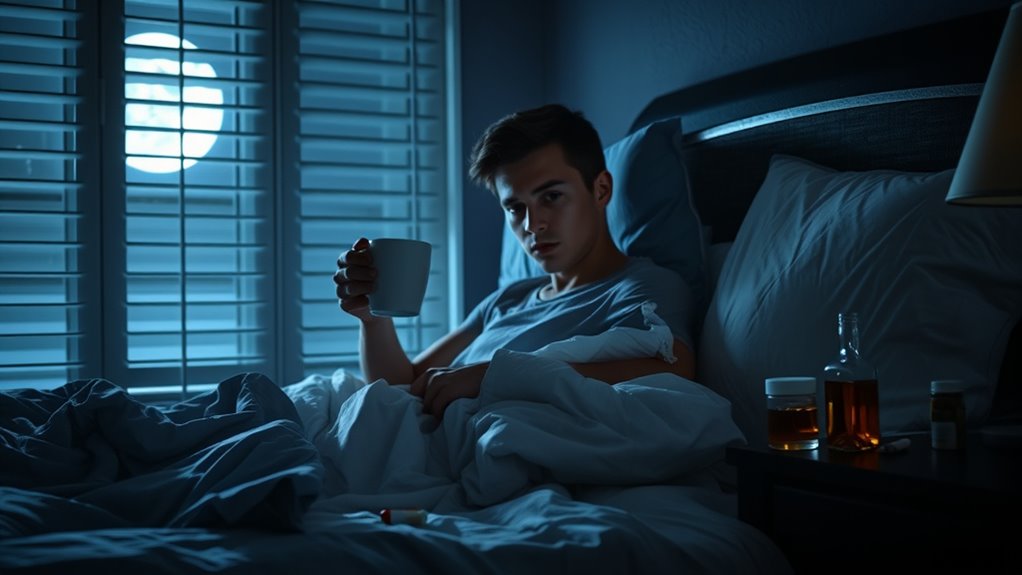
Alcohol and caffeine are two of the most commonly consumed substances that can considerably impact your sleep quality. When you drink alcohol, it initially makes you feel sleepy, but it disrupts your overall sleep cycle. Instead of progressing naturally through the different sleep stages, alcohol causes your sleep to become fragmented and less restorative. You might find yourself falling into a deep sleep quickly, but this isn’t the kind of restful sleep your body needs. As the night progresses, alcohol’s effects wear off, often leading to frequent awakenings, which prevents you from reaching the deep, REM-rich stages essential for mental and physical recovery. This interruption reduces the overall quality of your sleep, leaving you tired and groggy the next day.
Alcohol initially makes you sleepy but disrupts your sleep cycle, causing fragmentation and less restorative rest.
Caffeine, on the other hand, is a stimulant that blocks the action of adenosine, a chemical in your brain that promotes sleepiness. When you consume caffeine, especially in the hours leading up to bedtime, it makes it harder for you to fall asleep and disturbs your sleep cycle. Caffeine’s interference with the sleep cycle isn’t limited to just making it difficult to fall asleep; it also reduces the amount of REM sleep you get. REM sleep is crucial for memory consolidation, emotional regulation, and overall mental health. When caffeine suppresses REM, your sleep becomes less restorative, and you may wake up feeling unrefreshed, even if you technically slept for enough hours.
Both alcohol and caffeine can significantly affect your REM sleep, which is vital for your cognitive function and emotional well-being. Alcohol suppresses REM sleep during the first half of the night, leading to a rebound effect later on, where REM periods become more intense or prolonged. This fluctuation can cause vivid dreams or nightmares, further disturbing your sleep continuity. Caffeine’s ability to delay sleep onset and reduce REM sleep means you miss out on these critical phases altogether, disrupting your overall sleep architecture. Over time, these disturbances can lead to chronic sleep issues, impair your daytime functioning, and increase your risk for health problems like anxiety, depression, and cardiovascular disease.
Understanding how alcohol and caffeine affect your sleep cycle and REM sleep can help you make better choices about when and how much to consume. Cutting back on caffeine in the late afternoon and evening allows your body to enter and stay in the restorative stages of sleep. Limiting alcohol intake, especially close to bedtime, can help preserve your natural sleep architecture and improve the quality of your rest. Additionally, proper sound equipment and a conducive sleep environment can further enhance sleep quality. By paying attention to these factors, you can optimize your sleep and wake up feeling more refreshed and alert every day.
Frequently Asked Questions
Can Moderate Alcohol Intake Improve Sleep Quality Temporarily?
Moderate alcohol intake might give you temporary sleep improvement by helping you fall asleep faster. However, alcohol moderation can also disrupt your sleep cycle later in the night, leading to poorer quality rest overall. While it may seem beneficial initially, relying on alcohol for sleep isn’t healthy long-term. To truly improve sleep quality, focus on good sleep hygiene and avoid alcohol close to bedtime.
Does Caffeine Affect Sleep Differently Based on Genetic Factors?
Yes, caffeine affects your sleep differently based on genetic sensitivity and caffeine metabolism. If you have a genetic makeup that makes you highly sensitive, caffeine stays in your system longer, disrupting your sleep patterns more. Conversely, if your body metabolizes caffeine quickly, you might experience less sleep disturbance. Knowing your genetic sensitivity helps you manage caffeine intake better, ensuring it doesn’t interfere with your sleep quality.
How Does Alcohol Influence REM Sleep Stages?
Alcohol’s impact on your sleep is like a wrecking ball, drastically disrupting your rest. It suppresses REM sleep stages, causing you to miss out on restorative dreaming. Even small amounts can lead to REM suppression, making your sleep less deep and revitalizing. As a result, you might wake up feeling groggy, and your overall sleep quality suffers. So, if you value good sleep, it’s best to limit alcohol before bed.
Are There Long-Term Health Impacts From Sleep Disruption Caused by Caffeine?
Yes, long-term sleep disruption from caffeine can lead to serious health issues. You might experience chronic sleep deprivation, which affects your immune system and cognitive function. Hormonal imbalances, such as disrupted cortisol and melatonin levels, can also develop, increasing your risk for conditions like diabetes and heart disease. To protect your health, it’s best to limit caffeine intake, especially later in the day, and prioritize consistent, restful sleep.
Can Timing of Consumption Alter Alcohol or Caffeine’s Effects on Sleep?
Timing effects definitely matter. If you consume caffeine late in the day, it can keep you awake longer, disrupting sleep patterns. Similarly, drinking alcohol close to bedtime might initially make you drowsy but can lead to fragmented sleep later. Your consumption patterns play an essential role, so try to set a cut-off time for both to give your body a fair shot at quality rest—don’t let the train leave the station too late.
Conclusion
Imagine your mind as a quiet lake, smooth and still, ready for restful sleep. Alcohol might seem to calm your waves at first, but it stirs the depths overnight, disrupting peace. Caffeine, like a sudden gust of wind, disturbs your surface, making it hard to settle. To truly nurture your sleep, choose to let the gentle currents of natural rest guide you, avoiding the storms brought by alcohol and caffeine. Your peaceful lake awaits.
